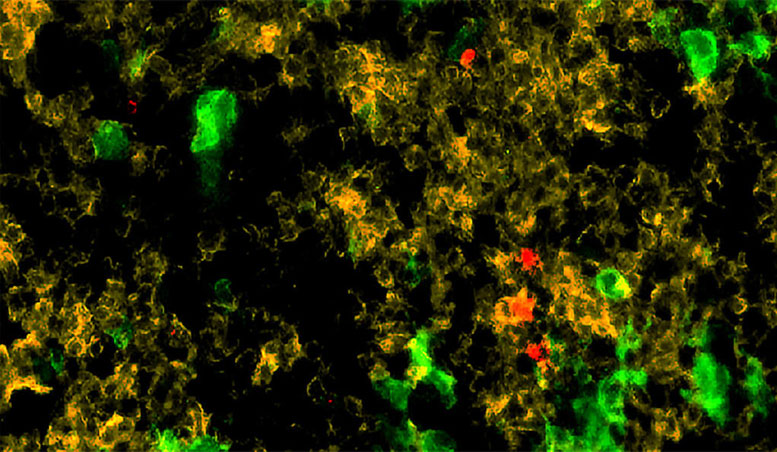
Image shows infiltration of transplanted human cancer cells (yellow/orange) by two myeloid cell subsets (red and green) in a mouse model treated with combination immunotherapy.
Cancer immunotherapy drugs have had notable but limited success because in many cases, tumors develop resistance to treatment. But researchers at Yale and Stanford have identified an experimental antibody that overcomes this problem by targeting a wider range of immune cells linked to tumor growth.
Existing cancer immunotherapies act on only a fraction of the immune cells implicated in the disease. In this study, the research team developed an antibody, KWAR23, to block a different set of immune cells known as myeloid cells. Many of these cells infiltrate tumors, triggering tumor growth, inflammation, and resistance to treatment.
In both cell culture and in mouse models with human cell membrane proteins, the research team found that the antibody blocked a protein that would otherwise limit the tumor-killing ability of myeloid cells. In combination with an approved cancer immunotherapy drug, the antibody significantly limited tumor cell growth.
The finding demonstrates a promising combination therapeutic approach to more effectively fight tumors, the researchers said. It will also lead to further research to examine whether the antibody is also effective in reducing more advanced and metastatic cancers.
Reference: “Anti-SIRPα antibody immunotherapy enhances neutrophil and macrophage antitumor activity” by Nan Guo Ring, Dietmar Herndler-Brandstetter, Kipp Weiskopf, Liang Shan, Jens-Peter Volkmer, Benson M. George, Melanie Lietzenmayer, Kelly M. McKenna, Tejaswitha J. Naik, Aaron McCarty, Yunjiang Zheng, Aaron M. Ring, Richard A. Flavell and Irving L. Weissman, 13 October 2017, PNAS.
DOI: 10.1073/pnas.1710877114









Be the first to comment on "Combination Antibody Immunotherapy Targets Cancer Resistance"